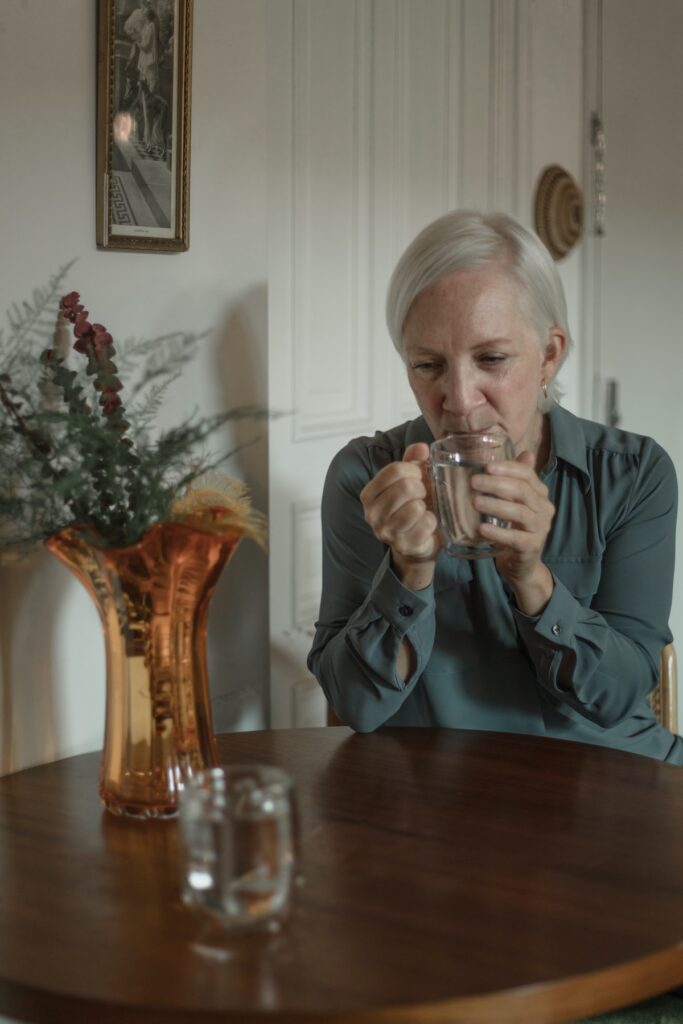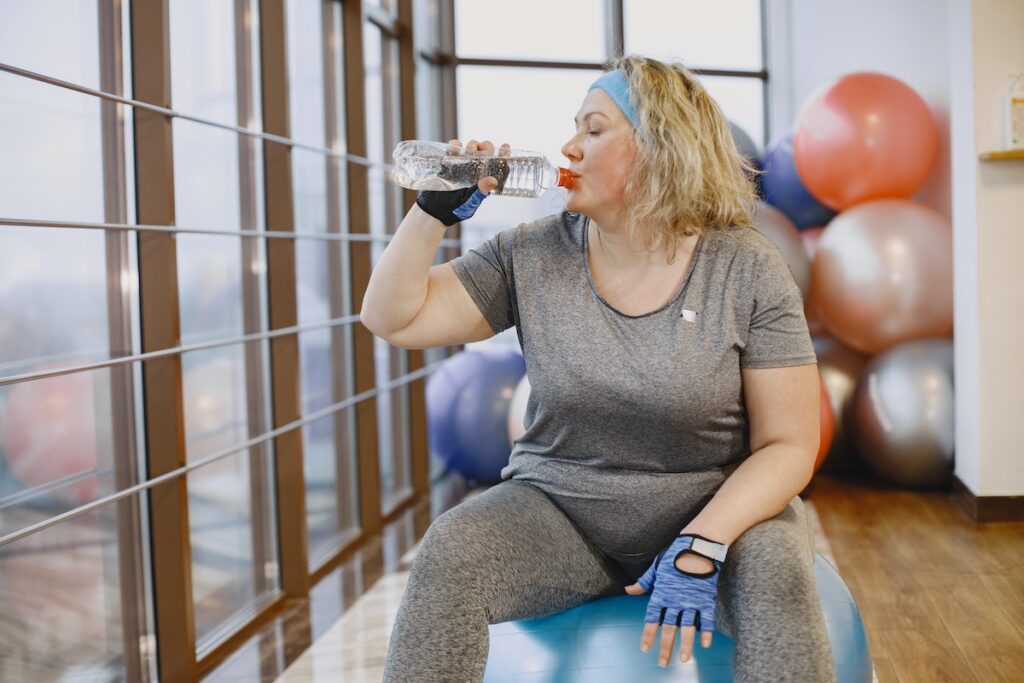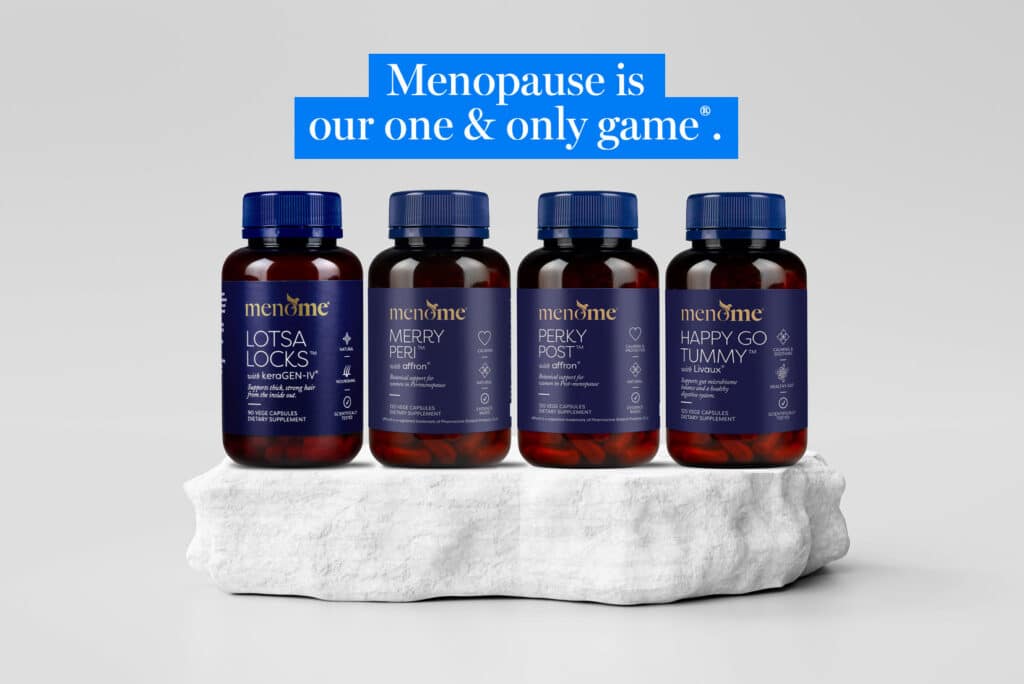Menopause and dehydration is ‘thing’. Indeed, it goes hand and hand with number one on our 7 Wellness Pillars For Your Best Menopause – Hydration & Nutrition.
While you may be thinking ‘yes, I’ve heard it all before’, basic dehydration is often overlooked especially menopause and dehydration!
Did you know? Our natural water volume diminishes with age.
So, hydration is key to your peri/menopause journey. What’s more, it’s simple and inexpensive and one of the basic staples of life.
Another key point is that if you’re well-hydrated it can help with many of your peri- and post-menopause symptoms. Things like fatigue, body temperature, brain fog, memory, digestion, constipation, bloating and mood1. Doesn’t that sound like music to your ears?
Related: The 34 Symptoms Of Perimenopause
Why drinking water during menopause is so important

Water is considered an essential nutrient. Our bodies are 60-70 per cent water – the figures are often conflicting but they’re always high. However, after menopause, experts say you have less body water volume, approximately 55%2. What’s more, our natural moisturising factors (NMF’s) reduce so we’re just ‘drier’.
But back to good ole’ H20, water helps many of the body’s key functions including – as mentioned above – gut health, poop and pee, energy, brain function and your detox pathways. In addition, it can help lubricate your joints and tissues. This can be especially helpful because as estrogen leaves the ovarian building they naturally become less ‘juicy’ and can be painful. But you might know that already via lived experience?
Couple that with the lower NMF’s and you’ve got a strong case for ensuring you sup your H2O on the regular.
Your body literally depends on water!
Plain, old-fashioned water (preferably spring or filtered) or high water content foods such as fresh fruit and veg.
How much water do you need to avoid menopause and dehydration?
The current rule of thumb is 35mls per kilogram of body weight. For example, if you’re 70kg then 2.4 litres per day. However, for some people that’s a bit complicated so if that’s you, try this app.
And remember, if you eat a lot of high water content foods such as fruit and vegetables that counts towards your daily quota.

Many experts suggest that the old adage of eight glasses a day doesn’t cut the mustard these days. However, drinking around two litres3 daily seems to be a good calculation. Although it does depend on your level of activity – regular exercisers need more. Furthermore, if you’re experiencing hot flushes and night sweats regularly you probably also need more.
Additionally, the older4 you are, the more you tend to need.
And then there are certain health conditions and prescription medications that can have an influence on the best amount for you. Therefore, it’s best to talk to your medical provider regarding your condition and/or medications impact on hydration.
Are you drinking enough water?
It can be hard to know, can’t it? Indeed, by the time you’re thirsty, you’re often in need of a good dose of H20.
But there are some well-known tell-tale signs that your body’s feeling a tad parched.

- Dark yellow urine – pale is the goal. (Bear in mind that if you take vitamin C or certain supplements they can impact the colour.)
- Fatigue/lack of energy
- Brain fog/cognition difficulties
- Headaches
- Increased hot flushes
- Constipation
- Dizziness
- More recurrent UTIs or incontinence
4 ways to drink more H2o
1. Invest in a gorgeous drink bottle or three
It seems like a no-brainer, doesn’t it? But if you have a great water bottle nearby you’re more likely to drink it. What’s more, if it has measurement guides you can easily keep tabs on your quota.
2. Track your intake
There are some great apps that can help with this such as Plant Nanny on Google Play. It’s super cute because you’ve got to keep a plant alive. But there are lots of others out there. And we made a free Water Tracker sheet for you here. Simply download and print it out as many times as you want. We pop it on the fridge or the desk and tick it off as we go.
3. Mix it up
As we mentioned earlier, high water content foods count so eat plenty of fresh fruit and vegetables. They’re high in water and the bonus is your microbiome thrives on them. A happy gut equals a happier you in peri/menopause. And herbal teas can be a watery treat too – you can use fresh leaves, beautiful blends such as Anxietea or Gut Feelings or a tea bag. And why not make some delicious infused waters to joosh things up?
Related: 3 Infused Water Thirst Quenchers
4. Set reminders on your phone and computer calendar
Set a reminder on your phone every 30 minutes. But remember, while this is easy peasy sometimes we can disassociate from reminders. So change it up every now and then.
Conclusion

The bottom line when it comes to menopause and dehydration is that water is essential. In fact, it can help ease your menopause transition.
It’s not difficult to drink more water, but it can be one of those baby steps that require consistency. Sometimes things that are perceived as tedious habits can make a huge difference.
Your body is amazing and it thrives on plain, simple water (without nasty additives). Although you may have found it surprising, drinking enough water can help minimise so many frustrating signs and symptoms.
Think brain fog, fatigue, UTIs, constipation, urge incontinence. So. Many. Things!
So, we hope these tips and tricks will help you in your hydration journey.
How much water do you drink in a day? We run a week-long hydration challenge in our 40+ Ageless Goddesses private Facebook group so if you’re up for the next one (date to be decided) come and join.
Share your thoughts in a comment below, on our Facebook page or in the 40+ Ageless Goddesses private Facebook group.
We’d love to help you become an H2O pro and avoid menopause and dehydration.
Disclaimer: Our articles are for information purposes only. As such, they are not a diagnostic tool. For this reason, if you are concerned about any signs and symptoms see your medical professional.
References:
- Pross N, Demazières A, Girard N, Barnouin R, Metzger D, Klein A, Perrier E, Guelinckx I. Effects of changes in water intake on mood of high and low drinkers. PLoS One. 2014 Apr 11;9(4):e94754. doi: 10.1371/journal.pone.0094754. PMID: 24728141; PMCID: PMC3984246.
- Stachenfeld NS. Hormonal changes during menopause and the impact on fluid regulation. Reprod Sci. 2014 May;21(5):555-61. doi: 10.1177/1933719113518992. Epub 2014 Feb 3. PMID: 24492487; PMCID: PMC3984489.
- Sawka MN, Cheuvront SN, Carter R 3rd. Human water needs. Nutr Rev. 2005 Jun;63(6 Pt 2):S30-9. doi: 10.1111/j.1753-4887.2005.tb00152.x. PMID: 16028570.
- Miller HJ. Dehydration in the Older Adult. J Gerontol Nurs. 2015 Sep 1;41(9):8-13. doi: 10.3928/00989134-20150814-02. PMID: 26375144.
Main image by Fernanda Latronico @pexe











